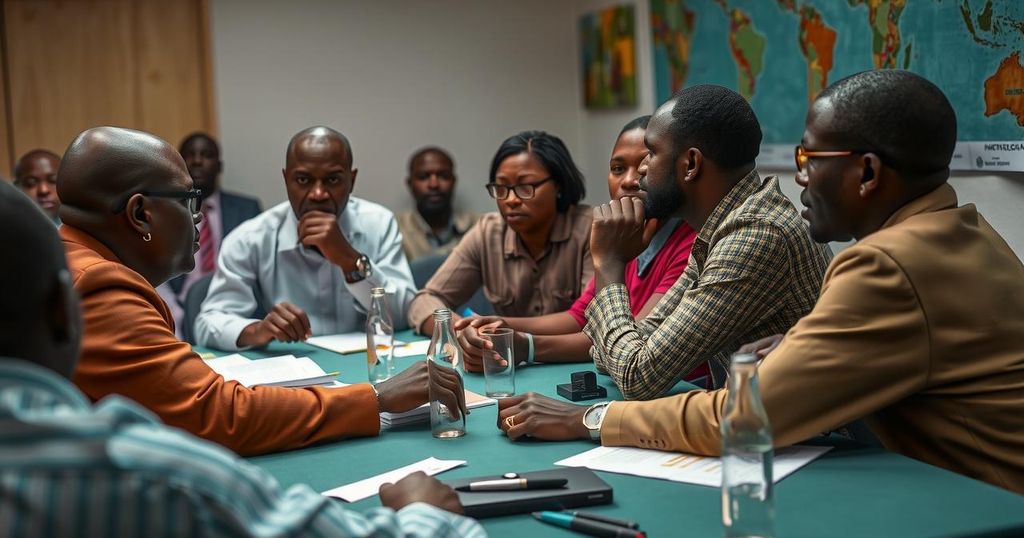The UN Security Council addressed ongoing violence in eastern DRC, with UN Special Representative Bintou Keita highlighting armed group activities and political instability. She praised regional mediation efforts and emphasized the need for concerted actions to enhance civilian protection and foster lasting peace amid humanitarian crises and governance reforms.
On Monday, the United Nations Security Council convened to address the urgent issue of ongoing violence in eastern Democratic Republic of the Congo (DRC). UN Special Representative Bintou Keita provided an update on the deteriorating security conditions in North Kivu and Ituri provinces, exacerbated by the activities of armed groups such as the Allied Democratic Forces (ADF), M23, CODECO, and Zaïre, as well as political disagreements surrounding constitutional reform. Ms. Keita lauded the efforts of regional mediation, particularly through the Luanda process, which aims to promote stability and foster effective collaboration among Angolan, Congolese, and Rwandan leaders at an upcoming summit on December 15.
Ms. Keita urged stakeholders to avoid further tensions around constitutional revisions and highlighted recent governance reforms initiated by the DRC authorities aimed at enhancing citizens’ welfare. She pointed out the importance of consolidating regional and local peace efforts and leveraging recommendations from civil society, including those presented by women’s groups during the Nairobi process. Moreover, she commended the establishment of a verification mechanism to monitor the ceasefire agreement between the DRC and Rwanda, which is a significant step toward ensuring peace in the region.
The situation in Ituri and North Kivu remains precarious, with the M23 expanding its territorial control and the ADF remaining the deadliest group, having committed numerous attacks on civilians. Although the frequency of attacks by CODECO and Zaire has diminished in the past three months, protecting civilians remains a high priority, especially given the links between violence and the exploitation of natural resources. Ms. Keita encouraged regional cooperation to combat illegal resource exploitation to weaken armed groups.
Continuing humanitarian crises, compounded by climate change, have led to the displacement of nearly 6.4 million people in the DRC, which poses additional challenges for humanitarian responses. Notably, the 2024 Humanitarian Response Plan reported over 50% funding, a significant increase compared to previous years. In light of the end of the global campaign addressing violence against women, Ms. Keita drew attention to over 90,000 cases of gender-based violence reported this year, emphasizing the need for continued prevention efforts and government accountability in addressing these issues. Finally, she affirmed the commitment to uphold a zero-tolerance policy for sexual exploitation by UN personnel and applauded the International Criminal Court’s renewed investigative efforts in the DRC.
The Democratic Republic of the Congo faces persistent violence, particularly in its eastern provinces, where armed groups have exploited resources amidst political instability. Recent conflicts have resulted in significant humanitarian issues, including widespread displacement and gender-based violence. Regional initiatives, such as the Luanda process, aim to mitigate these challenges through dialogue among involved nations. With an upcoming summit and ongoing reforms aimed at improving governance and security, the DRC seeks to navigate these turbulent times toward a path of lasting peace.
In conclusion, the UN Security Council’s discussions reflect the critical situation in the DRC, where ongoing violence necessitates immediate and coordinated responses. Ms. Bintou Keita’s report underscores the intersection of political stability, regional cooperation, and humanitarian efforts essential for restoring peace. As the DRC prepares for the summit and continues its reforms, active engagement from regional and international stakeholders remains vital to ensure a sustainable resolution to the conflict.
Original Source: news.un.org






